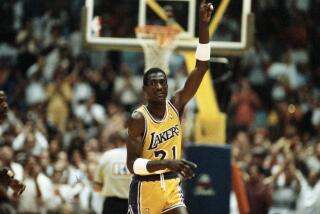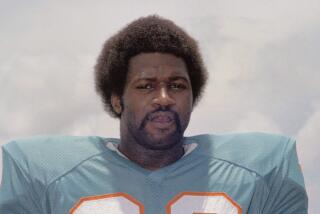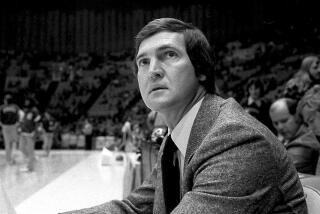Lakers’ 1972 championship team: ‘It was like one mind thinking alike’
- Share via
His eyes filled with tears. Jerry West’s hands trembled as he clutched the microphone. His voice squeaked as he spoke before an attentive audience at a Manhattan Beach hotel.
He and his teammates on the 1971-72 Lakers team gathered there Thursday commemorating the 40th anniversary of their championship run. West could have just marveled at the team’s 33-game winning streak, which still remains the longest winning streak in professional sports history. He could have just detailed how that season provided some solace for losing in nine previous NBA Finals appearances. West could have just dished out juicy anecdotes about that season.
West mentioned all those things. However, he outlined something more genuine and pure to explain how the 1971-72 Lakers captured the organization’s first NBA championship since moving to Los Angeles.
“This group of people are [some] of the nicest people I ever met in my life,” said West, who also celebrated with his former teammates Friday when the Lakers presented them with a ring in a halftime ceremony during the Lakers-Rockets game. “Forget personalities. We had a lot of different ones. But when you watch this team on the floor, it was like one mind thinking alike.”
The Lakers entered that season with plenty of obstacles that could have prevented that from happening.
Elgin Baylor retired nine games into the season after suffering numerous knee injuries.
The Lakers had fired coach Joe Mullaney and brought in Bill Sharman. Though he won four titles as a Boston Celtics guard from 1950-61, he had only two years of head coaching experience before joining the Lakers.
The Lakers featured three future Hall of Fame players in West, Gail Goodrich and Wilt Chamberlain, but many believed that season would mark their decline.
Things hardly turned out that way.
The Lakers finished with a 69-13 regular-season record, the highest in NBA history until the 1995-96 Chicago Bulls went 72-10. They cruised through the playoffs by sweeping Chicago in four games in the first round, beating Milwaukee in six games in the Western finals and beating the New York Knicks in five games in the championship series. And they set that 33-game winning streak they think won’t be surpassed.
“I’ve always believed that records are made to be broken, but I’m not sure that one’s going to be broken,” said Goodrich, who mentioned the Houston Rockets’ 22-game winning streak in the 2007-08 season. “It’s just very hard. It’s almost half a season. Especially today, I think, where players are jumping from one club to the other with free agency, I think it’s going to be very, very difficult.”
Yet, the 1971-72 Lakers managed to pull it off for various reasons.
Their aging Hall of Famers still maintained dominance.
West averaged at least 25 points for his 11th consecutive season, while leading the league with a 9.7 assists-per-game average that season. Goodrich became the NBA’s fifth leading scorer (25.9 points per game). Chamberlain, at age 35 in his second-to-last NBA season, may have averaged a career-low 14.9 points, but he made up for it with both efficiency (64% shooting) and hustle (league-leading 19.2 rebounds).
The Lakers featured plenty of key role players.
Second-year player Jim McMillian stepped in for Baylor at small forward and averaged 18.8 points on 48% shooting. Power forward Happy Hairston complemented Chamberlain in the frontline with 13.1 points and 13.1 rebounds. Leroy Ellis came off the bench to play both forward and center and provided endless energy. And Flynn Robinson and Pat Riley provided secondary scoring to the team’s backcourt.
That all came together, Riley said, because Sharman outlined clearly defined roles and the players often hung out on the road and hosted parties for one another at home.
“It was an incredible year where there was very little conflict,” Riley said. “The team was incredibly well managed by Bill and we all liked each other.... It was a simple time for a team to really be together. It’s different today.”
Sharman became the first coach to institute morning shootarounds, which West joked “ruined the league.” The technique helped sharpen the Lakers’ preparation. But it took Sharman to coax Chamberlain to change his late-sleeping habits even if it meant, as Riley recalled, the Lakers center showing up in beach attire.
Sharman’s scouting director Bill Bertka prepared more in-depth film sessions. But he avoided the monotony, West recalled, by slipping pictures of Playboy models into the footage.
And Sharman was relentless in shouting at the Lakers to keep a fast pace; in fact, the coach experienced voice problems attributed to damaged vocal cords.
But as the gathering at the Manhattan Beach hotel demonstrated, the team recalls all those efforts with fondness. Sharman arrived to the event in his car that features a “33 STR8” license plate. All living members of the 11-player roster attended; Chamberlain and Hairston have passed away. And they watched a 20-minute film commemorating their accomplishments, something that will be featured in a documentary sometime in 2013.
“It was just a magical year,” West said. “That’s all it was. Everything worked.”
RELATED:
All Things Lakers: 1971-72 season
Former Lakers assistant Jim Cleamons pursues college coaching job
Lakers’ 1972 championship team: ‘It was like one mind thinking alike’
E-mail the Lakers blog at [email protected]. Follow the Lakers blog on Twitter.
More to Read
All things Lakers, all the time.
Get all the Lakers news you need in Dan Woike's weekly newsletter.
You may occasionally receive promotional content from the Los Angeles Times.








